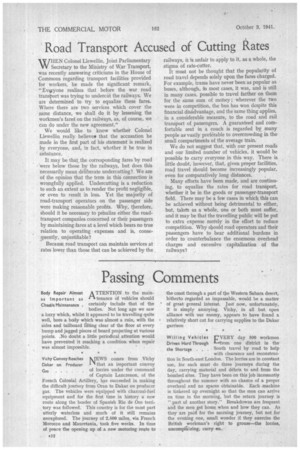Road Transport Accused of Cutting Rates
Page 14

If you've noticed an error in this article please click here to report it so we can fix it.
WHEN Colonel Llewellin, Joint Parliamentary Secretary to the Ministry of War Transport, was recently answering criticisms in the House of Commons regarding transport facilities provided for workers, he made the significant remark, "Evteryone realizes that before the war road transport was trying to underciit the railways. We are determined to try to equalize these fares. Where there are two services which cover the same distance, we shall do it by lessening the workmen's fare g on the railways, as, of course, we can do under the new agreement."
We would like to know whether Colonel Llewellin really believe m that the accusation he made in the first part of his statement is realized by everyone, and, in fact, whether it be true in substance.
It may be that the corresponding fares by road were below those by the railways, but does this necessarily mean deliberate undercutting?. We are of the opinion that the term in this connection is wrongfully applied. Undercutting is a reduction to such an extent as to render the profit negligible, or even to result in Toss. Yet the majority of road-transport operators on the passenger side were making reasonable profits. Why, therefore, should it be necessary to pebalize either the roadtransport companies concerned or their passengers by maintaining fares at a level which bears no true relation to operating expenses and is, consequently, unjustifiable?
Because road transport can maintain services at • rates lower than those that can be achieved by the railways, it is unfair to apply to it, as a whole, the stigma of rate-cutter. It must not be thought that the popularity of road travel depends solely upon the fares charged. For example, trams have never been as popular as buses, although, in most cases, it was, and is still in many cases, possible to travel farther on them for the same sum of money ; -wherever the two were in competition, the bus has won despite this financial disadvantage, and the same thing applies, in a considerable measure, to the road and rail transport of passengers. A guaranteed and com fortable seat in a coach is regarded by many people as vastly pref6rable to overcrowding in the small compartments of the aveiage train. We do not suggest that, with our present roads and our limited number of vehicles, it would be possible to carry everyone in this way. There is little doubt, however, that, given proper facilities, road travel should become increasingly popular, even for comparatively long distances. , Many efforts have been made, and are continuing, to equalize the rates for road transport, whether it be in the goods or passenger-transport field. There may be a few cases in which this can be achieved without being detrimental to either, but, taken as a whole, one or both must suffer, and it may be that the travelling public will be put to extra expense merely in the effort to reduce competition. Why sbould road operators and their passengers have to bear additional burdens in order to 'counterbalance the enormous overhead charges and excessive capitalization of the railways? ,




























































